Led an unmerry dance


Anyone who has visited the Outer Hebrides will tell you it can be a very bleak, foreboding place. So, just imagine what it was like living in small, cut-off villages back in 1914?
I have no doubt it was a rough existence indeed – and The Road Dance reflects this. In fact, the bleakness of the surroundings mirrors the darkness of the story.
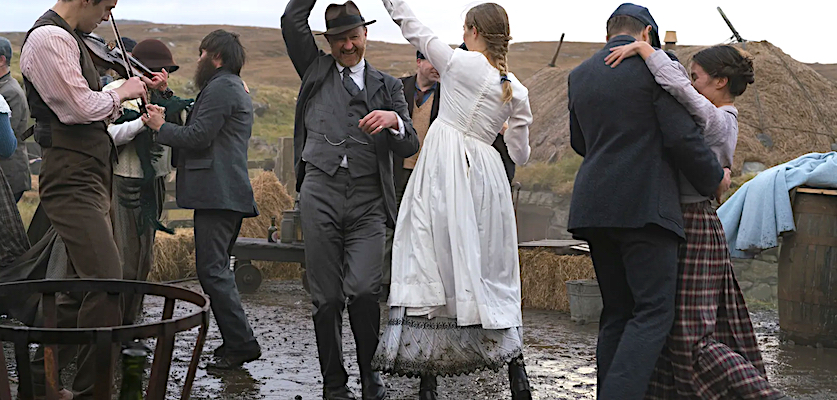 HOLDING BACK: "outsider" Mark Gatiss (centre) may not be all he seems to be in The Road Dance.
HOLDING BACK: "outsider" Mark Gatiss (centre) may not be all he seems to be in The Road Dance.
Set on the eve of the Great War, we are quickly introduced to young Kirsty Macleod, sensitivity played by Hermione Corfield, who experiences two tragic events which will have lifelong consequences. Based on a true story, the events that befall this innocent young girl affect not only her – but her family and the whole community.
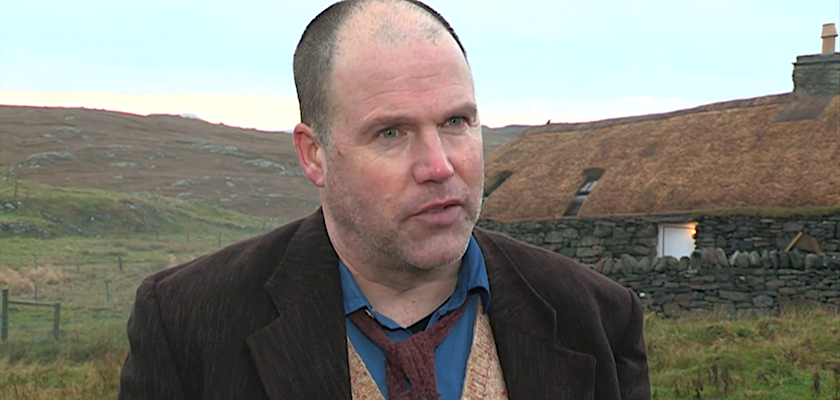 TRUE TO THE WORD: the film is faithful to the popular book written by author, John Mackay.
TRUE TO THE WORD: the film is faithful to the popular book written by author, John Mackay.
Simply directed by Richie Adams, this film also introduces us to an eclectic group of characters who may be – or may not be – involved in the central plot: Skipper is a reclusive old fisherman, while Mark Gatiss, the village doctor, is “an outsider” from the mainland, who plays a pivotal role giving nothing away about his character's real nature.
Meanwhile, Will Fletcher is the young man Kirsty is fated to fall in love with. Alas, he is sent off to fight and we do see some very effectively shot scenes in the trenches that bring his part of the tale to life.
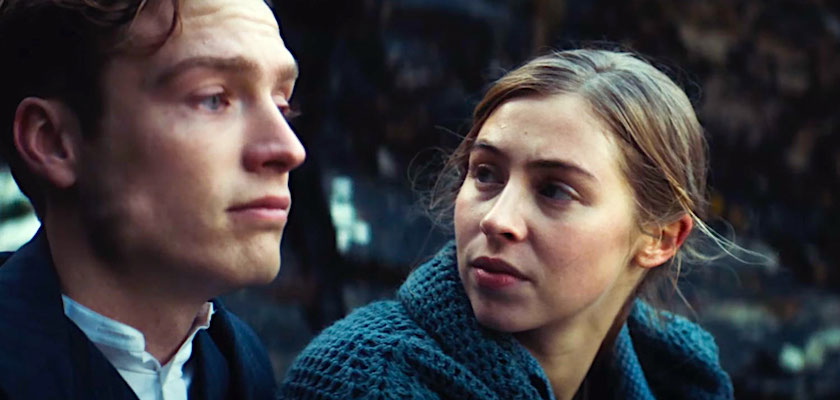 IN LOVE: Kirsty McLeod falls head over heels for France-bound Will Fletcher.
IN LOVE: Kirsty McLeod falls head over heels for France-bound Will Fletcher.
This whole film could easily be dismissed as a very depressing experience although those who have read John Mackay's book will know there is an uplift at the end.
Beautifully shot and showcasing the breathtaking beauty of the Isle of Lewis, Adams's character-based drama will certainly be worth seeing when it is released in the UK on 20 May.
Andy Godfrey is Sorted's film critic and a member of the Mark Kermode Appreciation Society.
'Ass' laws highlight injustice
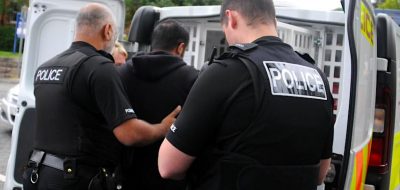
Last week, the Government finally agreed to abolish a ridiculous 200-year-old piece of law that further victimised people who are homeless.
The Vagrancy Act made rough sleeping and begging a criminal offence, and it was an ass.
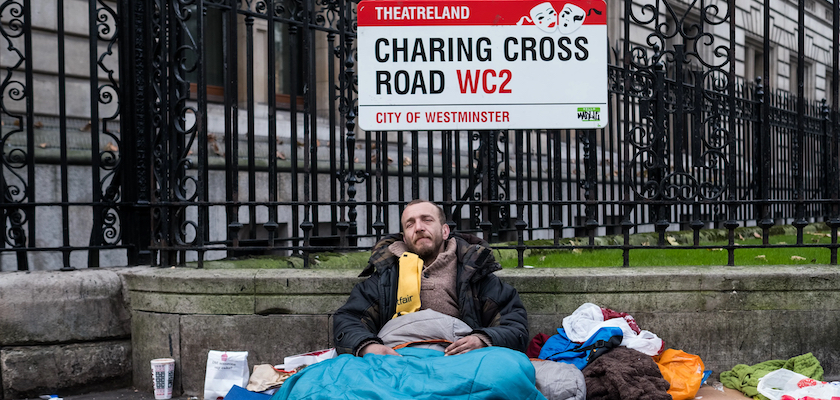 HARD TIMES: according to official figures, homelessness in our cities and towns is on the rise.
HARD TIMES: according to official figures, homelessness in our cities and towns is on the rise.
Have you ever seen this piece of legislation in action? I certainly have, and I was appalled. Homeless men and women, at their lowest points, were told to leave whatever town and city they were based in, or face arrest. Imagine that: you suffer a life of pain and rejection, as so many homeless people have, and in your greatest moment of need, you are rejected yet again – this time by the whole town and city.
Perhaps even worse than being told to leave a place, is not being given an alternative place to go. There simply are not enough homes or shelters to cater for all of the UK's homeless people. The message they are given is, ‘we don’t care where you go, as long as it is not here’.
What a dreadful way to treat people.
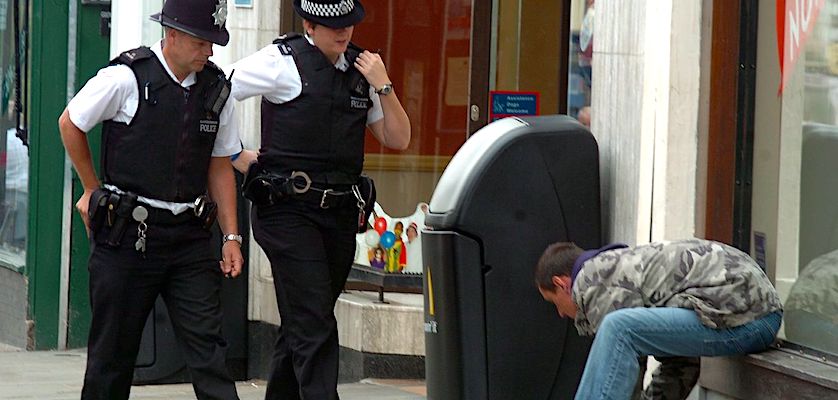 MOVING ON: police and councils are not slow in clearing homeless people out of urban areas.
MOVING ON: police and councils are not slow in clearing homeless people out of urban areas.
Homelessness is, and never should have been a criminal act. You only have to speak to people suffering homelessness to realise they are more a victim than a criminal mastermind. It took two centuries for the Government to realise that. What a shame, I wonder how many lives could have been changed or saved if only we had shown them compassion instead of kicking them when they were down.
Whilst I do applaud this Government for overturning this legislation, a new law, being debated in Parliament, could make it a criminal offence for people to live out of their car or vehicle. Given that this is the step most people must take when they are kicked out of their homes, the result could be dire.
Do you know an average of 91 families per day were made homeless during the pandemic (figures from the Office for National Statistics – April to June 2021)?
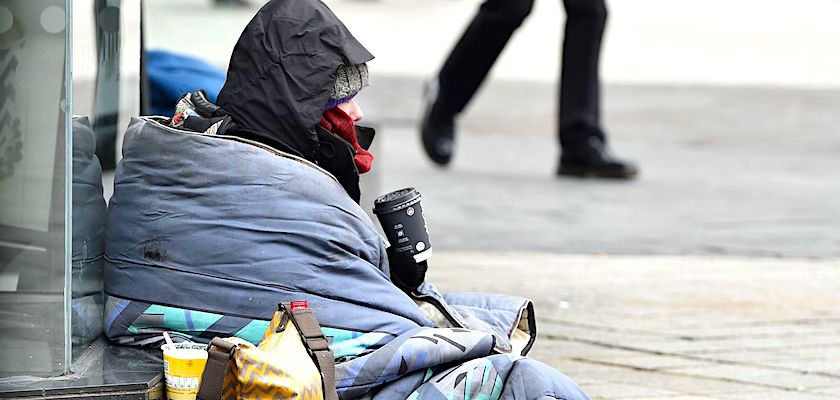 OUT OF THE FRYING PAN: while an old law has been scrapped, an equally bad one could replace it.
OUT OF THE FRYING PAN: while an old law has been scrapped, an equally bad one could replace it.
We really must stop finding new ways to make things worse for the homeless and, instead, pool our resources and energy to help them. For those without a place they can call home, the scales of justice have been out of balance for too long. Let’s bring about restoration and abolish retribution.
If you are interested in the homelessness crisis, and some of the innovative methods to overcome it, why not check out the latest edition of Sorted. It includes a special report on the national homelessness crisis that includes exclusive reports featuring the Church of England, the Salvation Army, Crisis, Habitat for Humanity and many more.
Chris Kerr is a regular Sorted columnist and a senior legal industry executive.
Wooed but not wowed

When a film is promoted as “the most anticipated of the year” – even though it’s only March – you must make an effort. So, I did.
With the dawn chorus striking up as I write one of the first UK reviews of The Batman blockbuster, I have to begin with the most obvious question: is it any good?
 TOP DRAW: Zoe Kravitz puts is a great performance and is excellent as Catwoman.
TOP DRAW: Zoe Kravitz puts is a great performance and is excellent as Catwoman.
Those who are invested in the brand will be pleased to learn it is very good, but it's not great. It is an over-long picture that just about did enough to keep me watching, but I wasn't always fully engaged.
What we have here is Batman doing a Philip Marlow, film noir, complete with narration. Batman reads to the viewer from his diary, sharing his inner thoughts and emotions as well as explaining why he does what he does. There is plenty of action – including a terrific car chase featuring the newly designed Batmobile – and a climactic final scene that reminds us our superhero is human.
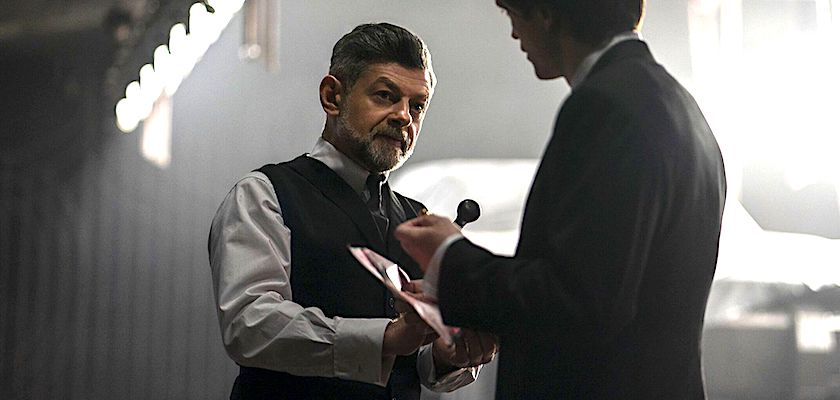 WE WANT MORE: Andy Serkis was under-used in the key support role of Alfred.
WE WANT MORE: Andy Serkis was under-used in the key support role of Alfred.
Robert Pattison, the tenth actor to don the cape on-screen, puts in a compelling performance, as does Zoe Kravitz, who is excellent as Catwoman.
Other familiar faces appear from the Gotham scrapbook, including The Penguin, The Riddler and Commissioner Gordon. A long line-up of established actors brings these roles to life in a way that is convincing and not over the top. The pick of the bunch is Jerry Wright – as Gordon – who delivers a very polished performance. The only real complaint here is that Andy Serkis’s Alfred is criminally under-used!
 DOUBLE FIGURES: Pattinson is the tenth actor to play the role of Batman on the big screen.
DOUBLE FIGURES: Pattinson is the tenth actor to play the role of Batman on the big screen.
Overall, this is a film that looks good, feels good and has a great Michael Giacchino soundtrack. As for the plot – it centres on The Riddler, who goes on the rampage. There is a method in his madness and is given a strong motivation for his actions – as wrong as they may be. But I have to say that while I was wooed by it, I wasn't wowed by it.
This latest instalment in the Batman franchise is too long and requires the viewer to concentrate to follow the story. It is one of those films I might appreciate more on a second viewing. There will inevitably be a sequel – and, when it arrives, there's no doubt which character will be at its heart.
Andy Godfrey is Sorted's film critic and a member of the Mark Kermode Appreciation Society.
Church's new homes vow
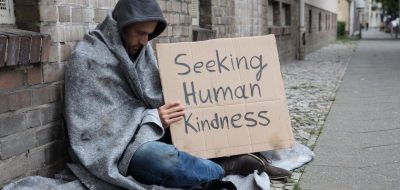
The Church of England has confirmed it is seeking to help more than 270,000 homeless people in the UK find a permanent home.
Writing exclusively in the latest edition of Sorted magazine, Guli Francis-Dehqani, the Bishop of Chelmsford, and Andrew Gray, a senior member of the General Synod, state there has been a huge shift in thinking within the Church of England – so much so, it is now actively looking at ways it can use its £9.2 billion of assets to finance a meaningful house-building programme.
And they should know what they're talking about: they lead two special groups commissioned by the church to investigate ways to alleviate the housing and homelessness crises.
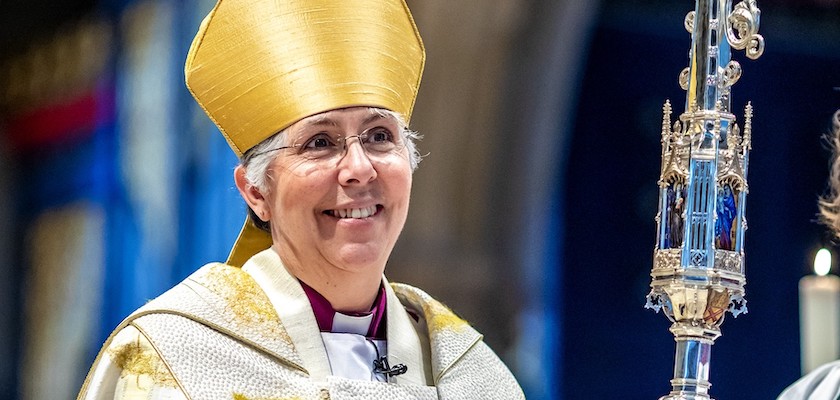 SIGN OF INTENT: Bishop Guli has declared the Church of England is keen to help in a meaningful way.
SIGN OF INTENT: Bishop Guli has declared the Church of England is keen to help in a meaningful way.
"As a major landholder, the Church is certainly in a good position to inaugurate the change we want to see," they write in our Special Report on Homelessness, which is included in the latest edition of the magazine. "The Church Commissioners have a £9.2 Billion asset portfolio, meaning the Church of England can borrow money very cheaply. That is a big advantage.
"Alas, land and money are not enough: it is the right stewardship of these gifts which will enable the Church to lead the way. Until recently, it typically sold off its assets, which generated revenue for mission and running costs. However, this has not always helped the poorest."
 LOOKING FORWARD: The Church is seeking to use its large asset base to finance house building.
LOOKING FORWARD: The Church is seeking to use its large asset base to finance house building.
While being a long way away from being able to quantify the scale of any Church-financed housing programme, the declaration by Bishop Guli and Andrew Gray has the potential to be a significant turning point.
"Learning to leverage land and buildings for the greater good is now creating a cultural shift within the Church of England," they continue.
"Prior to Covid, the Church was a key provider of night shelter and immediate relief from living on the streets. A parish church might find itself providing soup, socks and a space between the pews for people to spend the night. The pandemic has changed that dynamic; it is difficult to run emergency shelters with social distancing and disease restrictions! Instead, the focus is shifting towards the provision of housing."
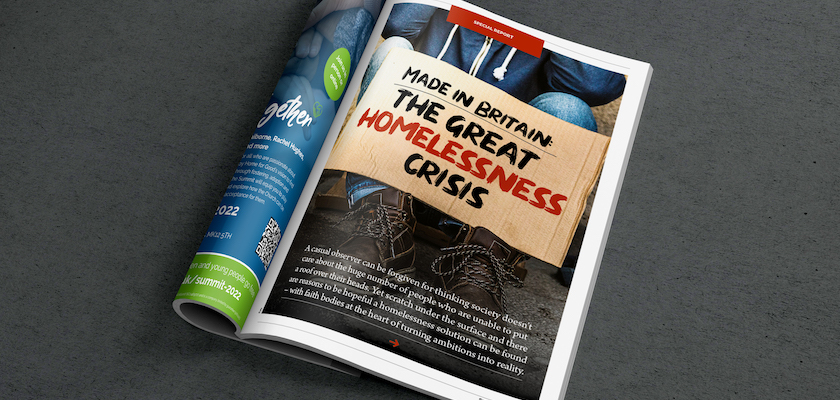 SPECIAL REPORT: the latest issue of Sorted examines what can be done to help?
SPECIAL REPORT: the latest issue of Sorted examines what can be done to help?
To read the full article, and others from the Salvation Army and the new chief executive of Crisis, one of the UK's largest charities for the homeless, as well as discovering how several not-for-profit bodies are working innovatively to tackle the scale of the problem, get your copy of Sorted from WH Smith or McColls today.
You can also subscribe to the magazine by clicking here.
Couple's vigil offers hope
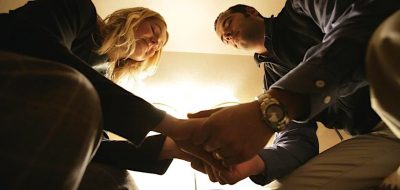
Once again, we live in uncertain times. But amidst the gloom and despair of war in Europe, allow me to bring you a story that offers us all real hope.
Gregor and Katarina are friends of mine. As their names suggest, they hail from eastern Europe – from Ukraine, no less.
Today, they live in the Guildford area, where Gregor is a vicar within the Church of England. Fifteen years ago, they were in their homeland, daring to dream but not quite believing their hopes would ever be realised.
The couple had been invited to come to England by a UK evangelist, where a bible college place was awaiting Gregor, an engineer. Yet so many obstacles stood in their way – not least a lack of money, nowhere to live and Gregor's acute unfamiliarity with the English language, which was a major hurdle that had to be overcome if a temporary residency visa was to be issued by the UK Government.
Rather than panic, or become disillusioned, Gregor and Katarina resorted to prayer in a bid to deal with the many conundrums they faced. In a nutshell, they totally surrendered to a higher authority. But not only did they commit to pray together for an hour every day, but they also pledged to bear their souls aloud!
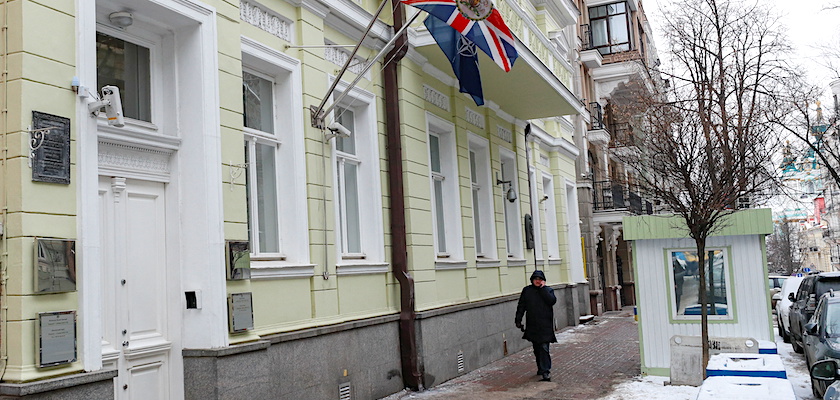 THE LONG WAIT: the British consul in Kyiv miraculously granted Gregor and Katarina a visa.
THE LONG WAIT: the British consul in Kyiv miraculously granted Gregor and Katarina a visa.
Despite any reservations, the couple started fulfilling their commitment to God. Every day, for at least an hour, they would go down on their knees and commune with our Creator. And the more they did so, the more confident they became. Not only that, but remarkable things started to happen.
The issues they had with money, accommodation in the UK, and a plethora of other things, all fell by the wayside. Several messages from their contacts in the UK, delivered over several months, told them of the remarkable things that were happening – some of us would say these acts bordered on the miraculous – as strangers came forward offering to support the young man and his wife.
Continuous prayers were also being said in the UK by at least one church congregation.
The progress was astounding and after a couple of years, all that remained was for the UK to rubberstamp their application. In anticipation, a one-way coach and ferry trip was organised. But there would be no second chance. There was enough cash to pay for one journey. If there were any hiccups, Gregor and Katrina's hopes of reaching the UK would be crushed.
Alas, there remained a huge problem: Gregor was required to pass a verbal reasoning test and, by his own admission, his command of English was still not nearly good enough. If he failed the test, a visa would not be forthcoming. It was as simple as that.
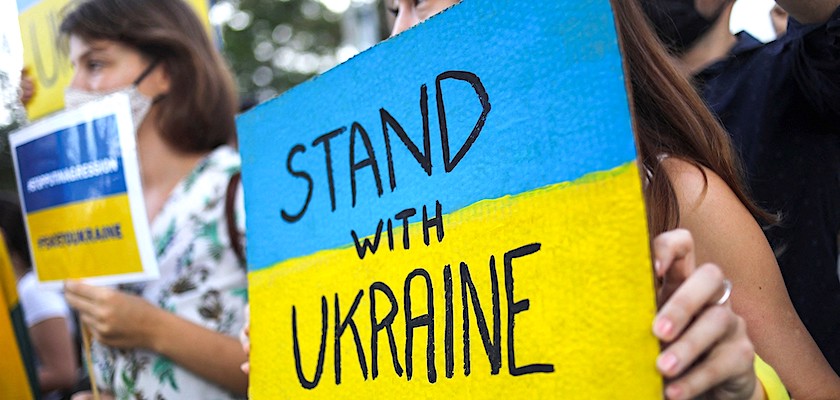 HOPING FOR A MIRACLE: protestors around the world are making their views known about Russia.
HOPING FOR A MIRACLE: protestors around the world are making their views known about Russia.
Fast forward to the day they visited the British consul in Kyiv; they arrived in the morning and were immediately greeted with a long queue. It seems many other Ukrainians also wanted to visit the UK, so they found themselves at the back of the line. Several hours passed with Gregor trying to recall and recite English words and phrases and becoming increasingly anxious despite Katarina's reassurances.
Eventually, with less than five minutes to go before the consul closed, and their dreams looking as though they were going to be crushed, a member of the Embassy's staff approached them. In their hand was a piece of paper.
"Here you go, here's your visa to the UK," said the official briskly, before he showed Gregor and Katarina to the door and wished them a safe journey. No interview was required by them, even though everyone who had preceded them had been grilled in some detail!
The cynics among us will be critical of the official for seemingly not doing his job properly. I think somewhat differently. I believe that the consul staff member was being used by God.
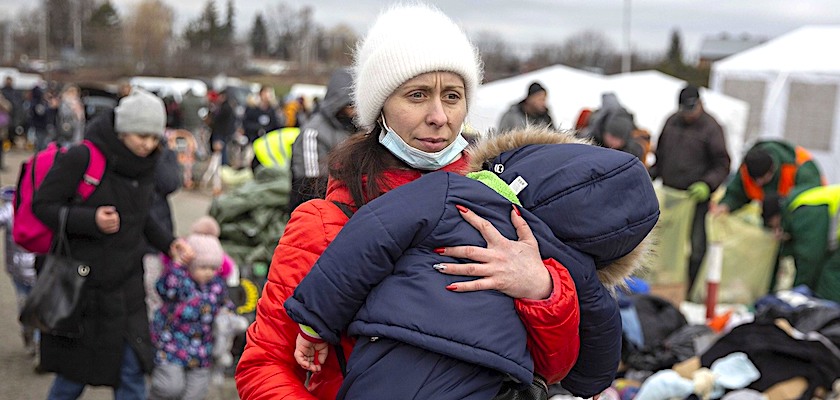 CASUALTIES OF WAR: families have been broken up and displaced since the conflict erupted.
CASUALTIES OF WAR: families have been broken up and displaced since the conflict erupted.
Today, this couple are among the many thousands of Ukrainians in the UK who have family and friends in places like Kyiv. As Britons, we cannot understand the extent to which their worlds have been turned upside down in just a few short days.
Every time I think of Ukraine, I think of Gregor and Katarina and their incredible faith. Their prayers – and those of many Britons – resulted in the impossible becoming possible.
The reason for sharing this story is to encourage you never to give up hope. If you are prepared to do the right things, and God is at the heart of all you do, it is amazing what can happen.
I do not know what God has planned for the current situation in Ukraine. But I do believe his protective hand will be over those believers who look to Him, just like Gregor and Katarina did all those years ago and continue to do today.
So please pray for Ukraine and put your faith in God. He really is more potent and powerful than any bullet, missile or tank.
Tony Yorke is the Deputy Editor of Sorted.



